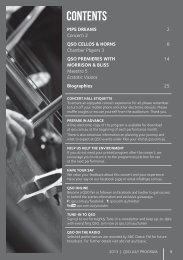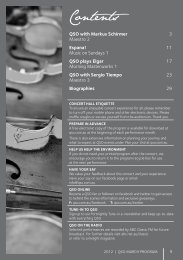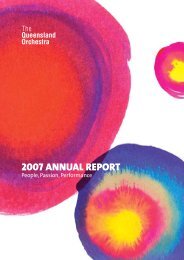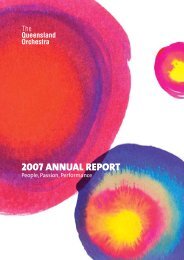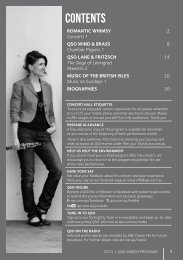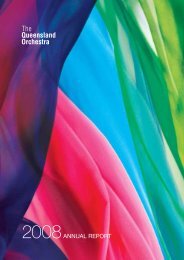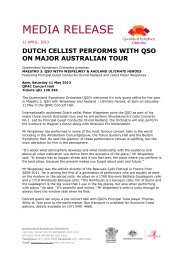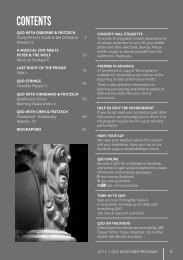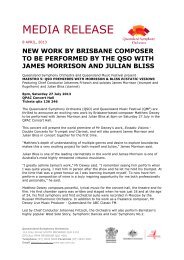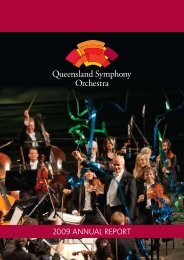2012 Annual Report - Queensland Symphony Orchestra
2012 Annual Report - Queensland Symphony Orchestra
2012 Annual Report - Queensland Symphony Orchestra
You also want an ePaper? Increase the reach of your titles
YUMPU automatically turns print PDFs into web optimized ePapers that Google loves.
21 <strong>Annual</strong> <strong>Report</strong> <strong>2012</strong> <strong>Annual</strong> <strong>Report</strong> <strong>2012</strong><br />
22<br />
Board Skills Mix at 31 December <strong>2012</strong><br />
Director (incl Board Responsibilities) Profession Skills<br />
Greg Wanchap<br />
(Chairman)<br />
Regional Financial Services Manager –<br />
<strong>Queensland</strong><br />
Crowe Horwath<br />
Corporate finance, business planning, mergers<br />
and acquisitions, corporate governance<br />
Jenny Hodgson Senior Producer - Programming Unit QPAC Arts management and production, facilities<br />
and venue specialist, previous general manager<br />
of an orchestra<br />
Jason Redman<br />
(Artistic Committee)<br />
Section Principal Trombone<br />
<strong>Queensland</strong> <strong>Symphony</strong> <strong>Orchestra</strong><br />
<strong>Orchestra</strong>l musician<br />
Tony Denholder<br />
(Finance and Audit Committee,<br />
January-April; <strong>2012</strong>; Chair, Artistic<br />
Committee from April <strong>2012</strong>)<br />
Tony Keane<br />
(Finance and Audit Committee)<br />
John Keep<br />
(Chairman, Finance and Audit)<br />
Marsha Cadman<br />
Karen Murphy<br />
(Finance and Audit Committee<br />
from April <strong>2012</strong>)<br />
Sub-Committees of the Board<br />
Partner<br />
Ashurst<br />
Head of Corporate and Institutional Banking<br />
National Australia Bank<br />
Principal<br />
TyTo Corporation<br />
Director<br />
Broman Consulting<br />
Various directorships<br />
Commercial law, government, major projects,<br />
resources and energy, native title.<br />
Banking and finance, commerce<br />
Corporate governance, financial management<br />
and business development<br />
Marketing and brand strategy,<br />
communications, issues management<br />
Governance, innovation, cultural change<br />
Corporate performance is enhanced by the establishment of appropriate sub-committees who meet regularly to provide recommendations<br />
and advice to the Board. The sub-committees are: Finance and Audit Committee (which includes risk assessment and management<br />
responsibilities) and Artistic Committee. Each committee has established terms of reference.<br />
3. Promote ethical and responsible<br />
decision making<br />
The Board sets the ethical tone and standards of the organisation<br />
through its vision and goals. The Board acknowledges the<br />
importance of the approved Code of Conduct which is included<br />
in its Charter and they ensure senior management implement<br />
practices and exhibit behaviours consistent with the required<br />
standards. This addresses all matters of ethics and behaviour<br />
including the declaration of conflict of interest which is a standing<br />
item at each Board and sub-committee meeting. Any declarations<br />
are duly minuted and where a significant conflict exists, the<br />
Director concerned absents his or her self from the meeting while<br />
the item is considered. The company also has a Code of Conduct<br />
for all employees including key executives, contained in the<br />
company policies and procedures.<br />
Board members understand their legal obligations and duties and<br />
the reasonable expectations of the organisation’s stakeholders<br />
through the induction process and the QSO Charter.<br />
4. Promote diversity<br />
A diversity policy was approved by the Board in early 2011.<br />
It includes information on Aboriginality, gender, age, ethnicity,<br />
disability and cultural background. The organisation seeks to<br />
establish measurable objectives for achieving diversity by assessing<br />
annually both the objectives and progress in achieving them.<br />
5. Safeguard integrity in financial<br />
reporting<br />
The Finance and Audit Committee has its own Terms of Reference<br />
and is of sufficient size, independence and technical expertise to<br />
discharge its functions effectively. Its members are financially<br />
literate and the committee includes at least one member with<br />
financial expertise, as demonstrated by relevant qualifications and<br />
financial management experience at senior management level in<br />
the public or private sector.<br />
Ernst & Young performs QSO’s annual audit to ensure the<br />
organisation’s financial statements are consistent with Australian<br />
accounting standards. The Finance and Audit committee reports<br />
monthly to the Board on matters pertaining to its role.<br />
6. Recognise the legitimate<br />
interests of stakeholders<br />
The Board provides guidance in the development of appropriate<br />
policies to ensure legal and legislative obligations to current and<br />
prospective internal stakeholders are met (e.g. Occupational Health<br />
and Safety, Bullying and Harassment, Equal Opportunity and Anti-<br />
Discrimination). The Board ensures the appointment of suitably<br />
equipped executives to meet other company legal obligations.<br />
As QSO’s external stakeholders are largely income-providing,<br />
company departments are provided with clear responsibility<br />
for stewarding specific stakeholder sectors. As such, the Chief<br />
Executive’s office manages relationships with funding bodies,<br />
the Development and Sales department manages sponsors,<br />
the Philanthropy department manages donor relations, and the<br />
Marketing department manages customer relations.<br />
The Board releases an <strong>Annual</strong> <strong>Report</strong> which provides information to<br />
the general public on its artistic and financial performance.<br />
7. Recognise and manage risk<br />
The Finance and Audit Committee provides advice to the Board<br />
on the status of business risks and integrated risk management<br />
programs aimed at ensuring risks are identified, assessed and<br />
appropriately managed. Major business risks arise from such<br />
matters as government policy changes, the use of business<br />
information systems, economic climate in relation to sponsorships<br />
and donations, action by competitors and their impact on<br />
orchestral performances.<br />
Comprehensive practices are established such that:<br />
capital expenditure and revenue commitments above a certain<br />
size obtain prior Board approval<br />
financial exposures are controlled<br />
occupational health and safety standards and management<br />
systems are monitored and reviewed to achieve high standards<br />
of performance and compliance with regulations, and<br />
complemented by preventative in-house programs<br />
business transactions are properly authorised and executed.<br />
A Management Statement is signed annually prior to the signing<br />
of accounts to manage risks. The organisation’s financial reports<br />
present a true and fair view of the organisation’s financial condition<br />
and operational results and are in accordance with relevant<br />
accounting standards; the Board passes a resolution regarding this<br />
prior to signing the accounts. QSO’s financial reports are founded<br />
on a sound system of risk management and internal control to<br />
ensure that the system is operating effectively in all material<br />
respects in relation to financial reporting risks.<br />
Clear role descriptions and lines of reporting have also been<br />
established to address any potential conflict between the<br />
fundamental roles of Chief Executive and Chief Conductor in<br />
managing day to day issues of an orchestra. The Director - Artistic<br />
Planning reports to the Chief Executive who has ultimate authority<br />
over artistic decisions.<br />
8. Remunerate fairly and responsibly<br />
The <strong>Orchestra</strong>’s Directors are not financially remunerated, however<br />
the company has an approved remuneration policy to attract and<br />
retain motivated employees. Prior to the appointment of the Chief<br />
Executive Officer, Chief Financial Officer and Chief Conductor, their<br />
remuneration levels and responsibilities are carefully considered<br />
by the Board. As part of the Chief Executive Officer’s annual<br />
performance appraisal the Board also considers any appropriate<br />
increase in remuneration levels.<br />
The Board is committed to supporting management in raising<br />
remuneration levels fairly and responsibly within the financial<br />
resources of the company and taking into account results linked<br />
to performance management and productivity. The musicians’<br />
Enterprise Agreement is regularly updated and agreed upon for<br />
musicians, which provides for salary increases while granting<br />
productivity gains for the company. No individual, or management,<br />
is directly involved in deciding their own remuneration.



